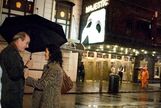New York is a microcosm of globalization. One is a true international metropolis, and the other is the same international city. I think it is Hong Kong (I don’t know much about London, but the concept of New York Port-nylonkong proposed in a certain issue of Time magazine makes me Impressive), for historical reasons, the two cities have very different attitudes towards immigration and are generally very open. Although Hong Kong is a special administrative region of China, China has given Hong Kong the most detached status that a city of a nation-state can obtain, and adopts the most liberal governance over it. The door is wide open. In such a place that is open to the extreme, there is no such thing as the stern measures and the skeptical non-ethnic mentality that New York, an international metropolis of another nation-state, has taken against immigrants for anti-terrorism and economic reasons.
Regardless of how professors define an important aspect of globalization as the free movement of people, policymakers, policy makers, and indigenous peoples are incapable of accepting even the imagining of a world in which people at all levels can move freely. If we consider the scarcity of resources, the most basic starting point of Western economics, mobility will only lead to a more unequal aggregation of resources, rather than a more rational distribution. Whether globalization is a trap, or the earth is flat, sweatshops, abused immigrants, starvation, poverty, epidemics, fundamentalist terrorism...the future is getting harder and harder to picture. So why don't we think from a different angle.
View more about The Visitor reviews











